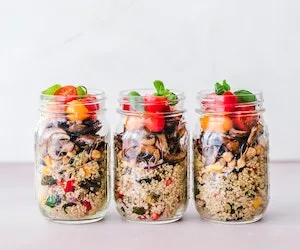
Meal prep has become increasingly popular in recent years as people look for ways to eat healthier and save time in their busy lives. Meal prep is the practice of preparing meals in advance, typically for the week ahead, and storing them in the fridge or freezer for later consumption. This article will explore the benefits of meal prep and provide tips for getting started.
Benefits of Meal Prep
- Saves Time: Meal prep can save you a significant amount of time during the week. By spending a few hours on the weekend preparing meals, you can avoid spending time each day deciding what to eat and preparing each meal from scratch.
- Saves Money: Meal prep can also save you money by helping you avoid buying expensive takeout or eating out at restaurants. When you prepare your meals at home, you can buy ingredients in bulk and take advantage of sales and discounts.
- Promotes Healthy Eating: Meal prep makes it easier to eat healthy because you can control the ingredients and portions in each meal. By preparing healthy meals in advance, you are less likely to reach for unhealthy snacks or fast food when you are hungry and pressed for time.
Getting Started with Meal Prep
- Plan Your Meals: The first step in meal prep is to plan your meals for the week ahead. Look for healthy recipes that are easy to make and can be prepared in large batches. Make a list of ingredients you will need and go grocery shopping to stock up on everything you need.
- Prepare Your Meals: Once you have your ingredients, set aside a few hours to prepare your meals. You can cook your meals in bulk and portion them out into individual containers. Label each container with the name of the meal and the date it was prepared.
- Store Your Meals: Store your prepared meals in the fridge or freezer until you are ready to eat them. If you are storing them in the freezer, be sure to allow them to thaw in the fridge overnight before reheating.
Tips for Successful Meal Prep
- Start Small: If you are new to meal prep, start with a few simple recipes and gradually work your way up to more complex dishes.
- Use the Right Containers: Invest in good quality containers that are microwave and dishwasher safe. Look for containers that are stackable and easy to transport.
- Don’t Forget Snacks: Preparing healthy snacks, such as cut-up vegetables, fruit, or nuts, can help you avoid reaching for unhealthy options during the day.
- Mix it Up: To avoid getting bored with your meals, try to mix up your recipes each week. Look for new and interesting recipes to try.
Conclusion
Meal prep is a great way to eat healthy and save time in your busy life. By planning your meals in advance, preparing them in bulk, and storing them in the fridge or freezer, you can avoid the stress of deciding what to eat each day and save money by avoiding expensive takeout or restaurant meals. With a little planning and preparation, meal prep can become a healthy and sustainable habit in your daily life.
